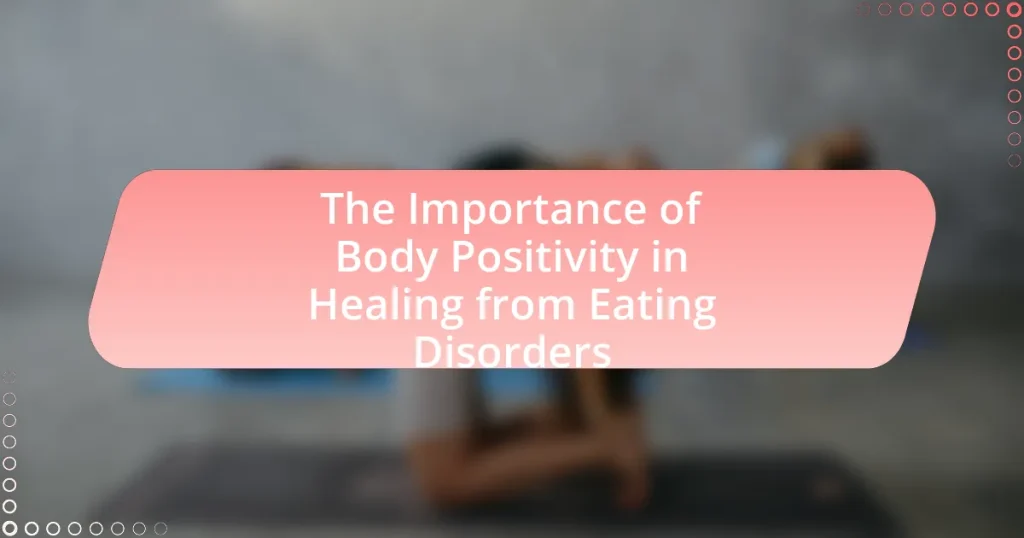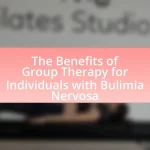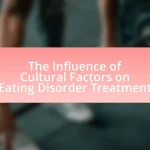Body positivity is a crucial element in the healing process for individuals recovering from eating disorders, as it promotes self-acceptance and challenges harmful societal beauty standards. The article explores the significance of body positivity in reducing disordered eating behaviors, enhancing self-esteem, and improving mental health outcomes. It discusses the psychological benefits of embracing body positivity, the challenges faced in promoting it, and the role of educational resources and online communities in fostering a supportive environment. Additionally, it outlines practical strategies for integrating body positivity into recovery journeys, emphasizing its importance for long-term healing and relapse prevention.
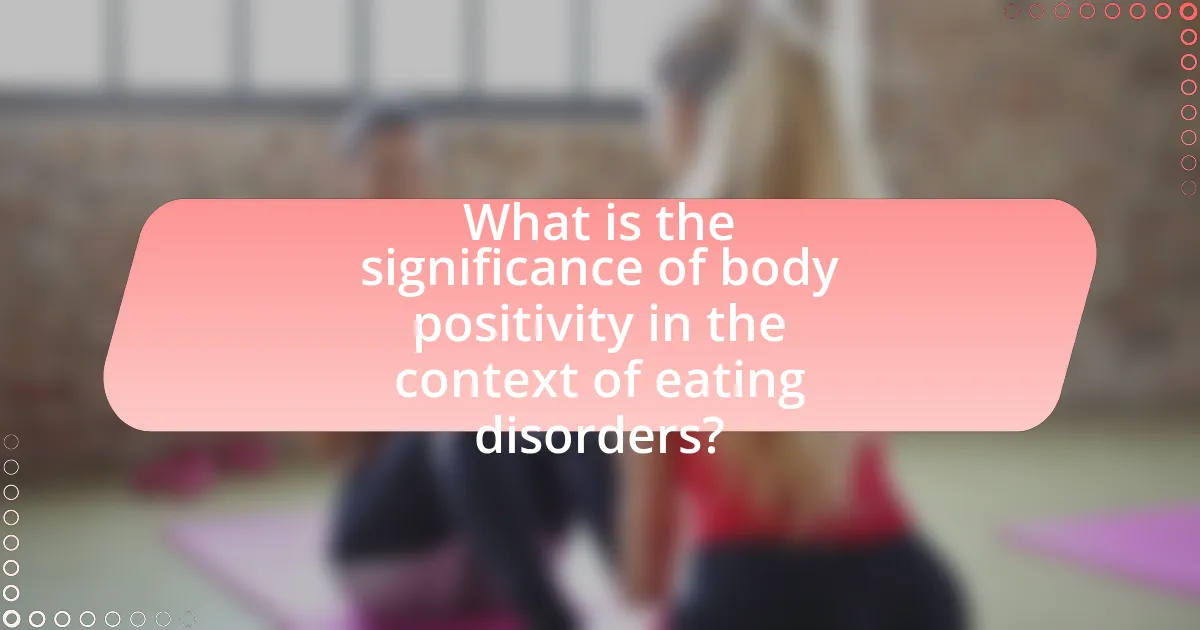
What is the significance of body positivity in the context of eating disorders?
Body positivity is significant in the context of eating disorders as it promotes self-acceptance and challenges societal beauty standards that often contribute to these disorders. By fostering a positive body image, individuals are encouraged to appreciate their bodies regardless of size or shape, which can reduce the risk of developing eating disorders. Research indicates that body positivity initiatives can lead to improved mental health outcomes, as seen in a study published in the journal “Eating Disorders” by Tylka and Wood-Barcalow, which found that individuals who embrace body positivity experience lower levels of disordered eating behaviors. This evidence underscores the role of body positivity in healing and recovery from eating disorders.
How does body positivity influence the recovery process from eating disorders?
Body positivity significantly enhances the recovery process from eating disorders by fostering a healthier self-image and reducing stigma associated with body size. Research indicates that individuals who embrace body positivity are more likely to engage in self-acceptance, which can lead to improved mental health outcomes. A study published in the journal “Eating Disorders” found that body positivity interventions can decrease disordered eating behaviors and promote a more balanced relationship with food and body image. This shift in mindset allows individuals to focus on holistic well-being rather than conforming to societal beauty standards, ultimately facilitating a more effective recovery journey.
What are the psychological benefits of embracing body positivity during recovery?
Embracing body positivity during recovery from eating disorders significantly enhances psychological well-being by fostering self-acceptance and reducing negative self-talk. This acceptance leads to improved self-esteem, as individuals learn to appreciate their bodies for their functionality rather than their appearance. Research indicates that body positivity can decrease symptoms of anxiety and depression, which are commonly associated with eating disorders. A study published in the journal “Body Image” by Tylka and Wood-Barcalow (2015) found that individuals who practice body positivity report higher levels of life satisfaction and lower levels of body shame. Thus, the psychological benefits of body positivity during recovery include enhanced self-esteem, reduced anxiety and depression, and overall improved mental health outcomes.
How does body positivity affect self-esteem and self-acceptance in individuals with eating disorders?
Body positivity significantly enhances self-esteem and self-acceptance in individuals with eating disorders by promoting a healthier relationship with their bodies. This movement encourages individuals to embrace their physical appearance, which can counteract the negative self-perception often associated with eating disorders. Research indicates that adopting a body-positive mindset can lead to improved mental health outcomes, as it reduces feelings of shame and inadequacy. For instance, a study published in the journal “Body Image” found that participants who engaged with body positivity interventions reported higher levels of self-acceptance and lower levels of body dissatisfaction. This evidence supports the notion that body positivity serves as a crucial element in the recovery process for those struggling with eating disorders, fostering a more compassionate self-view and ultimately aiding in healing.
Why is body positivity essential for long-term healing from eating disorders?
Body positivity is essential for long-term healing from eating disorders because it fosters a healthier relationship with one’s body, which is crucial for recovery. Embracing body positivity helps individuals challenge societal beauty standards and internalized negative beliefs about their bodies, reducing the risk of relapse. Research indicates that individuals who practice body positivity experience improved self-esteem and body image, which are vital components in overcoming eating disorders. A study published in the journal “Eating Disorders” found that body acceptance is linked to lower levels of disordered eating behaviors, highlighting its role in sustainable recovery.
What role does body positivity play in preventing relapse after recovery?
Body positivity plays a crucial role in preventing relapse after recovery from eating disorders by fostering a healthy self-image and reducing negative body-related thoughts. When individuals embrace body positivity, they are more likely to develop resilience against societal pressures and internalized stigma, which can trigger relapse. Research indicates that body positivity is associated with improved mental health outcomes, as it encourages acceptance of diverse body shapes and sizes, thereby decreasing the likelihood of engaging in disordered eating behaviors. A study published in the journal “Body Image” found that individuals who practiced body positivity reported lower levels of body dissatisfaction and were less likely to relapse into unhealthy eating patterns.
How can body positivity contribute to healthier body image perceptions?
Body positivity can contribute to healthier body image perceptions by promoting acceptance of diverse body types and challenging societal beauty standards. This movement encourages individuals to appreciate their bodies for their functionality rather than solely for appearance, which can reduce negative self-talk and improve self-esteem. Research indicates that individuals who engage with body positivity messages report lower levels of body dissatisfaction and higher levels of self-acceptance. For instance, a study published in the journal “Body Image” found that participants exposed to body positive content showed significant improvements in body image and self-worth compared to those who were not. This evidence supports the notion that body positivity fosters a more inclusive and supportive environment, ultimately leading to healthier body image perceptions.
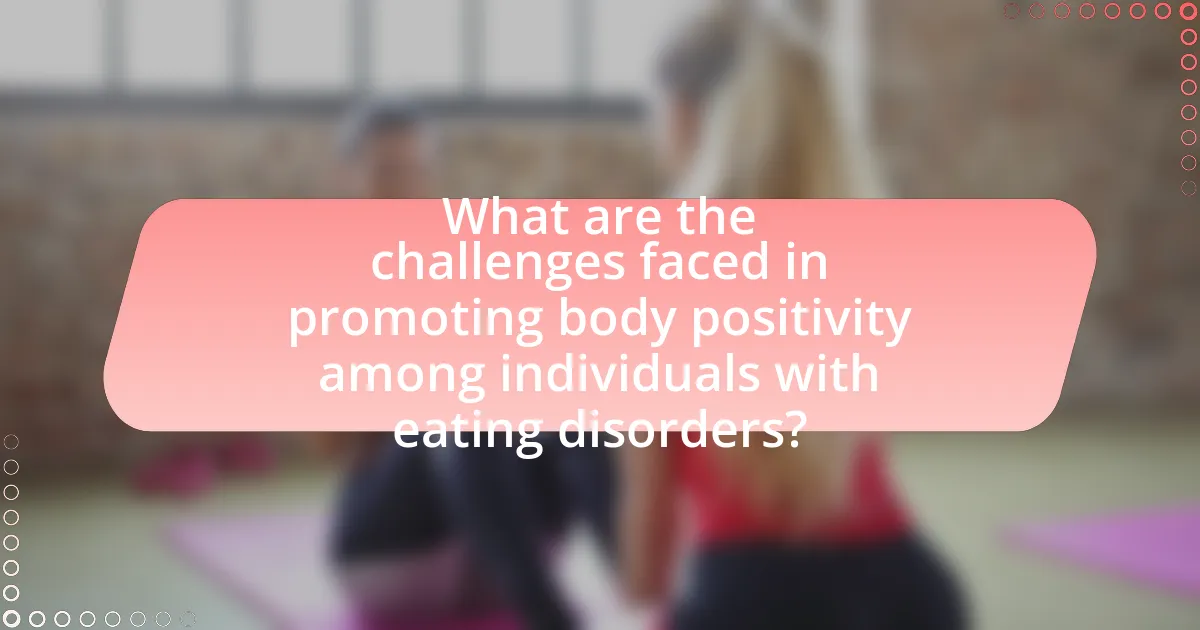
What are the challenges faced in promoting body positivity among individuals with eating disorders?
Promoting body positivity among individuals with eating disorders faces significant challenges due to the complex nature of these disorders. Individuals often struggle with distorted body image, which can hinder their ability to accept and appreciate their bodies. Research indicates that approximately 70% of individuals with eating disorders experience body dissatisfaction, making it difficult to foster a positive self-image. Additionally, societal pressures and media portrayals of ideal body types can exacerbate feelings of inadequacy, further complicating the promotion of body positivity. These external influences can lead to resistance against body acceptance initiatives, as individuals may prioritize societal standards over personal well-being.
How do societal standards of beauty impact body positivity efforts?
Societal standards of beauty significantly hinder body positivity efforts by promoting unrealistic and narrow definitions of attractiveness. These standards often emphasize thinness, youth, and specific body shapes, leading individuals to internalize negative self-perceptions and dissatisfaction with their bodies. Research indicates that exposure to idealized images in media correlates with increased body dissatisfaction and lower self-esteem, particularly among women (Tiggemann & Slater, 2014, International Journal of Eating Disorders). Consequently, these societal pressures can undermine initiatives aimed at fostering acceptance and love for diverse body types, making it challenging for individuals to embrace body positivity as a means of healing from eating disorders.
What are the common misconceptions about body positivity in relation to eating disorders?
Common misconceptions about body positivity in relation to eating disorders include the belief that body positivity promotes unhealthy eating habits and that it is solely about self-acceptance without addressing underlying issues. Critics often argue that body positivity encourages individuals to neglect their health, but research indicates that body positivity can actually foster a healthier relationship with food and self-image, which is crucial for recovery from eating disorders. Additionally, body positivity is not just about accepting all body types; it also emphasizes the importance of mental health and emotional well-being, which are essential components in the healing process from eating disorders.
How can negative media portrayals hinder the acceptance of body positivity?
Negative media portrayals hinder the acceptance of body positivity by perpetuating unrealistic beauty standards and stigmatizing diverse body types. These portrayals often emphasize thinness as the ideal, leading individuals to internalize negative self-perceptions and body dissatisfaction. Research indicates that exposure to idealized body images in media correlates with increased rates of eating disorders and body image issues, as evidenced by a study published in the journal “Body Image” by Groesz et al. (2002), which found that media exposure negatively impacts women’s body satisfaction. Consequently, such negative representations create an environment where body positivity struggles to gain traction, as individuals may feel alienated from the movement due to feelings of inadequacy and societal pressure.
What strategies can be employed to foster body positivity in recovery programs?
To foster body positivity in recovery programs, strategies such as promoting self-acceptance, incorporating body neutrality practices, and utilizing positive affirmations can be employed. Self-acceptance encourages individuals to embrace their bodies as they are, which has been shown to reduce negative body image and improve overall mental health. Body neutrality practices focus on appreciating the body for its functionality rather than its appearance, which can help shift the focus away from societal beauty standards. Positive affirmations reinforce a healthy self-image and can lead to improved self-esteem. Research indicates that these strategies can significantly enhance the recovery process for individuals with eating disorders, as they create a supportive environment that prioritizes mental well-being over physical appearance.
How can therapy and support groups incorporate body positivity into their practices?
Therapy and support groups can incorporate body positivity into their practices by integrating body acceptance exercises and discussions that challenge societal beauty standards. These practices can include guided visualizations that promote self-love, sharing personal stories that highlight diverse body experiences, and providing educational resources that emphasize the importance of body diversity. Research indicates that fostering a positive body image can significantly reduce the risk of eating disorders and improve overall mental health outcomes, as evidenced by a study published in the Journal of Eating Disorders, which found that body positivity interventions led to decreased body dissatisfaction among participants.
What role do educational resources play in promoting body positivity?
Educational resources play a crucial role in promoting body positivity by providing accurate information and fostering a supportive environment. These resources, such as workshops, books, and online platforms, educate individuals about the diversity of body shapes and sizes, helping to challenge societal beauty standards. Research indicates that exposure to body-positive educational materials can reduce body dissatisfaction and improve self-esteem among individuals, particularly those recovering from eating disorders. For instance, a study published in the Journal of Eating Disorders found that participants who engaged with body-positive content reported a significant decrease in negative body image and an increase in body appreciation. This evidence underscores the effectiveness of educational resources in cultivating a culture of acceptance and self-love, essential for healing from eating disorders.
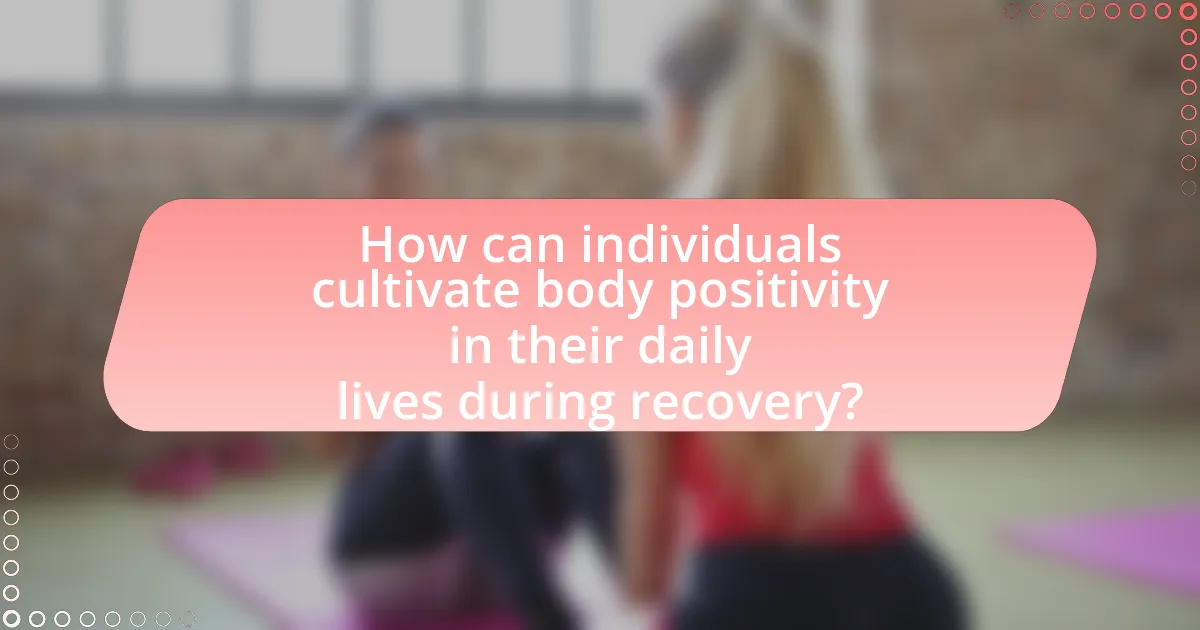
How can individuals cultivate body positivity in their daily lives during recovery?
Individuals can cultivate body positivity in their daily lives during recovery by practicing self-compassion and engaging in positive self-talk. Self-compassion involves treating oneself with kindness and understanding, especially during challenging moments, which has been shown to reduce negative body image and promote emotional well-being. Engaging in positive self-talk reinforces a healthier self-perception; studies indicate that individuals who replace negative thoughts with affirmations experience improved body image and self-esteem. Additionally, surrounding oneself with supportive communities that promote body acceptance can further enhance body positivity, as social support is crucial in the recovery process from eating disorders.
What practical steps can be taken to embrace body positivity?
To embrace body positivity, individuals can practice self-acceptance by focusing on their unique qualities and strengths rather than perceived flaws. Engaging in positive self-talk and challenging negative thoughts about one’s body can significantly improve self-image. Research indicates that individuals who participate in body positivity movements report higher self-esteem and lower levels of body dissatisfaction, as shown in a study published in the journal “Body Image” by Tiggermann and Slater (2014), which found that exposure to body-positive media can enhance body satisfaction. Additionally, surrounding oneself with supportive and affirming communities can reinforce positive body image and foster a healthier relationship with one’s body.
How can mindfulness and self-compassion enhance body positivity?
Mindfulness and self-compassion enhance body positivity by fostering a non-judgmental awareness of one’s thoughts and feelings, which reduces negative self-criticism. Research indicates that practicing mindfulness helps individuals recognize and accept their bodies without harsh evaluations, leading to improved body image. A study published in the journal “Body Image” by Kelly H. Werner and colleagues found that self-compassion is associated with greater body appreciation and lower levels of body shame. This combination of mindfulness and self-compassion creates a supportive internal dialogue, encouraging individuals to treat themselves with kindness rather than judgment, ultimately promoting a healthier relationship with their bodies.
What are some daily affirmations that promote body positivity?
Daily affirmations that promote body positivity include statements such as “I appreciate my body for all it does for me,” “I am worthy of love and respect regardless of my size,” and “My body is unique and beautiful just as it is.” These affirmations encourage self-acceptance and foster a positive relationship with one’s body. Research indicates that positive affirmations can reduce negative self-talk and improve mental well-being, which is crucial in the context of healing from eating disorders. For instance, a study published in the journal “Psychological Science” by Cohen et al. (2009) found that self-affirmation can lead to increased resilience and improved emotional health.
What resources are available to support body positivity in the context of eating disorders?
Resources available to support body positivity in the context of eating disorders include organizations, online platforms, and therapeutic approaches. Notable organizations such as the National Eating Disorders Association (NEDA) provide educational materials, support groups, and helplines that promote body positivity and recovery. Online platforms like Instagram and TikTok feature body positivity advocates who share personal stories and promote acceptance of diverse body types, fostering a supportive community. Additionally, therapeutic approaches such as Acceptance and Commitment Therapy (ACT) focus on enhancing self-acceptance and reducing negative body image, which are crucial in the healing process from eating disorders. These resources collectively contribute to a culture of body positivity, essential for recovery.
Which organizations focus on body positivity and eating disorder recovery?
Organizations that focus on body positivity and eating disorder recovery include the National Eating Disorders Association (NEDA), the Body Positive, and Project HEAL. NEDA provides resources, support, and advocacy for individuals affected by eating disorders, emphasizing the importance of body acceptance in recovery. The Body Positive promotes self-love and body acceptance through workshops and educational programs, aiming to empower individuals to embrace their bodies. Project HEAL offers financial assistance for treatment and promotes body positivity through community outreach and awareness campaigns. These organizations collectively contribute to the movement for body positivity and support recovery from eating disorders.
How can online communities contribute to fostering body positivity?
Online communities can significantly contribute to fostering body positivity by providing a supportive environment where individuals share experiences and promote acceptance of diverse body types. These platforms often facilitate discussions that challenge societal beauty standards, allowing members to express their feelings and receive validation from others who understand their struggles. Research indicates that participation in online support groups can lead to improved self-esteem and body image, as individuals find solidarity and encouragement in their journeys. For instance, a study published in the Journal of Eating Disorders found that individuals engaging in online communities focused on body positivity reported lower levels of body dissatisfaction and higher levels of self-acceptance.
What are the best practices for integrating body positivity into recovery journeys?
The best practices for integrating body positivity into recovery journeys include fostering self-acceptance, promoting positive self-talk, and encouraging body neutrality. Fostering self-acceptance involves recognizing and valuing one’s body regardless of its shape or size, which has been shown to improve mental health outcomes in individuals recovering from eating disorders. Promoting positive self-talk helps individuals challenge negative beliefs about their bodies, leading to enhanced self-esteem and resilience. Encouraging body neutrality shifts the focus from appearance to functionality, allowing individuals to appreciate their bodies for what they can do rather than how they look. Research indicates that these practices can significantly reduce body dissatisfaction and improve overall well-being during recovery, as evidenced by studies published in journals such as the International Journal of Eating Disorders.
